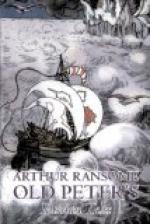The peasant set to work, and piled all the gold into the cart down to the very last gold piece; while Misery sat on the stone and watched, groaning and chuckling in his weak, wretched little voice.
“Be quick,” says Misery; “and then we can get back to the tavern.”
The peasant looked into the pit to see that there was nothing left there, and then says he,—
“Just take a look, little Master Misery, and see that we have left nothing behind. You are smaller than I, and can get right down into the pit....”
Misery slipped down from the stone, grumbling at the peasant, and bent over the pit.
“You’ve taken the lot,” says he; “there’s nothing to be seen.”
“But what is that,” says the peasant—“there, shining in the corner?”
“I don’t see it.”
“Jump down into the pit and you’ll see it. It would be a pity to waste a gold piece.”
Misery jumped down into the pit, and instantly the peasant rolled the stone over the hole and shut him in.
“Things will be better so,” says the peasant. “If I were to let you out of that, sooner or later you would drink up all this money, just as you drank up everything I had.”
Then the peasant drove home and hid the gold in the cellar; took the oxen and cart back to his neighbour, thanked him kindly, and began to think what he would do, now that Misery was his master no longer, and he with plenty of money.
“But he had to work for a week to pay for the loan of the oxen and cart,” said Vanya.
“Well, during the week, while he was working, he was thinking all the time, in his head,” said old Peter, a little grumpily. Then he went on with his tale.
As soon as the week was over, he bought a forest and built himself a fine house, and began to live twice as richly as his brother in the town. And his wife had two new dresses, perhaps more; with a lot of gold and silver braid, and necklaces of big yellow stones, and bracelets and sparkling rings. His children were well fed every day—rivers of milk between banks of kisel jelly, and mushrooms with sauce, and soup, and cakes with little balls of egg and meat hidden in the middle. And they had toys that squeaked, a little boy feeding a goose that poked its head into a dish, and a painted hen with a lot of chickens that all squeaked together.
Time went on, and when his name-day drew near he thought of his brother, the merchant, and drove off to the town to invite him to take part in the feast.
“I have not forgotten, brother, that you invited me to yours.”
“What a fellow you are!” says his brother; “you have nothing to eat yourself, and here you are inviting other people for your name-day.”
“Yes,” said the peasant, “once upon a time, it is true, I had nothing to eat; but now, praise be to God, I am no poorer than yourself. Come to my name-day feast and you will see.”




